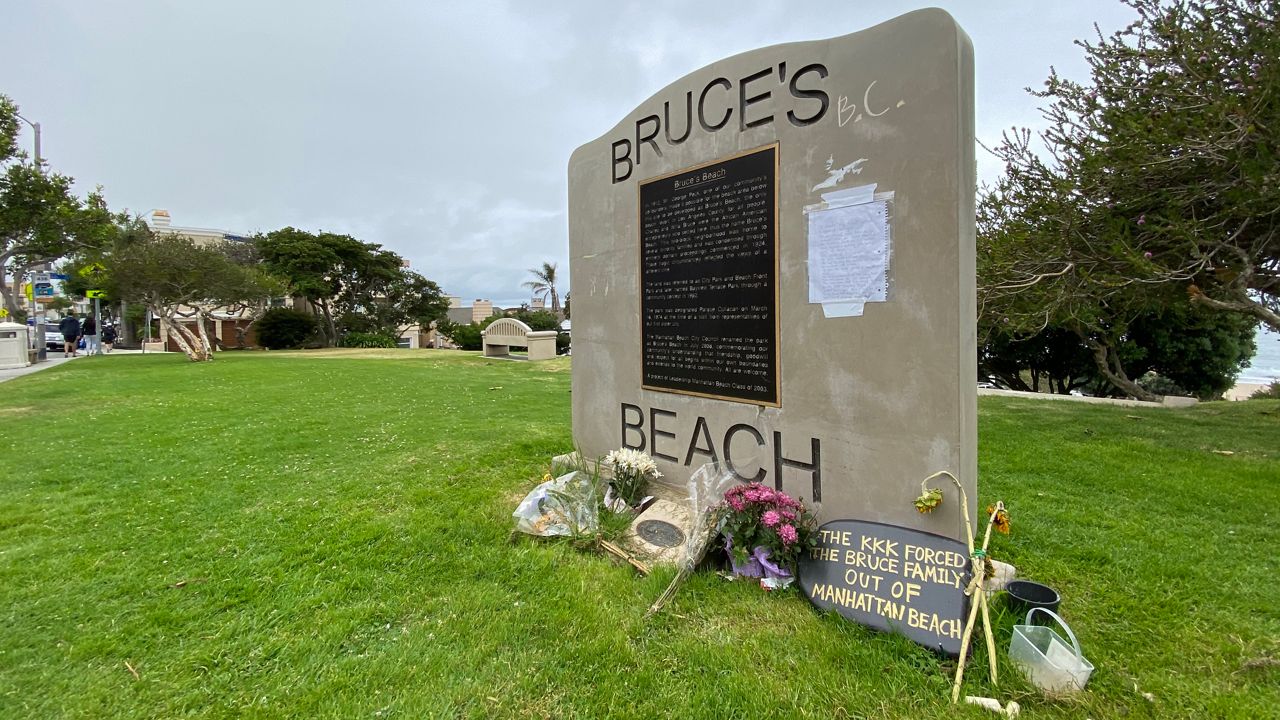LOS ANGELES — The Los Angeles County Board of Supervisors voted on Tuesday to throw their weight behind the movement to restore land to the descendants of a Black family that had their beachfront land taken from them by eminent domain nearly a century ago.
In two unanimous decisions, the five supervisors voted to determine a plan for transferring County-owned land to the descendants of Willa and Charles Bruce; and declared formal support of California Senate Bill 796, a proposed bill that would make transferring the land from the County to those descendants legal.
“We have the opportunity not only to right a wrong that happened right here in LA County, but also to be an example to the rest of the nation on how governments can begin to act now to correct historic injustices,” said Supervisor Janice Hahn, who represents the region.
For more than a decade in the 1910s and 1920s, Willa and Charles Bruce owned and operated Bruce’s Lodge, just off the sand in Manhattan Beach. Their resort was one of the few Black-friendly resorts in Los Angeles County.
Their businesses were the most prominent feature of what was then a burgeoning Black neighborhood. But their success upset members of the surrounding community.
By 1924, the City of Manhattan Beach moved to use eminent domain to seize two city blocks, where the Bruces and a handful of other Black families owned property. About a dozen white landowners were also affected — however, only the affected Black families had buildings on their property. In court proceedings, Manhattan Beach claimed the seizures were necessary to build a park.
A park wouldn’t be built until the late 1950s — almost 30 years after court proceedings had finished. Eventually, after a series of land transfers, LA County would come to own the oceanfront land once owned by the Bruces. Today, a lifeguard building sits on their former property.
Amid the reawakened social justice movement of 2020, activists such as Justice for Bruce’s Beach called on lawmakers to acknowledge the city’s past wrongdoing and make amends to the descendants of the Bruce family. Hahn learned of the Bruce family’s story then and followed along as the City of Manhattan Beach organized a task force to determine how to properly acknowledge its past history of racism and honor the Bruce family.
On April 6, a majority of the Manhattan Beach City Council approved a “statement of acknowledgement and condemnation,” rather than an apology.
The approved statement, an opposing council member said, was written with language that “minimized” the city’s past racially motivated actions, and portrayed past racism as not-yet-confirmed.
Three days later, Hahn organized a news conference announcing her intent to return the land to the Bruce family, with the support of fellow Supervisor Holly Mitchell, and a handful of legislators including SB 796 author State Sen. Steve Bradford, as well as co-authors Assemblymember Al Muratsuchi, Assemblymember Autumn Burke, and Sen. Ben Allen.
Senate Bill 796 is currently in the committee process. Should it pass both chambers of the California Legislature, it would take effect immediately following the approval of Governor Gavin Newsom. The idea, Bradford said in last week’s press conference, is to transfer control of the land to the Bruce family by year’s end.
The law would then give the Bruce descendants an opportunity to do with the land as they wish — though County officials hope that, for a little while at least, they can lease the land at least temporarily to continue lifeguard training and operations at the existing facility.
One of the orders given by the supervisors at Tuesday’s meeting tells county staff to determine a timeline and appropriate steps for transferring the land to the Bruce family descendants, to determine how to address property tax issues, and to determine how the County might continue using the land, or a relocation plan.
“Over many decades, underrepresented groups of people, Black and brown people’s communities, have been ravaged,” Mitchell said at this week’s meeting. “Housing covenants and zoning throughout LA history have been devices used to keep a community down, to have direct impact on limiting multi-generational wealth, limiting home ownership, and really challenging equity.”
“To have the opportunity to return to a family a property that was taken form them base don racist ideology and discrimination is a great moment in Los Angeles history today,” Mitchell said. “This is but one example of a dream deferred.”
Board Chair Hilda Solis recalled the history of freeway construction that sliced through Black and Latino communities, of forced sterilizations against women of color at Los Angeles County Hospital, and of the seizure of homes and land at Chavez Ravine for Dodger Stadium.
“All of these things are a part of our history. We can’t remove them, but we can shine a light on them, and make sure that they never come back,” Solis said. “And this is a way to do it, and to pay homage to this family, the Bruce family, that deserves so much more.”
The county’s act, supervisors Mitchell and Hahn said, is not a gift to the Bruce family, but returning stolen property. Shortly before the vote, Hahn closed out comments by recalling a question she’s fielded over the past week.
“I’ve been asked, are you afraid that it will start a precedent?” Hahn said. “I said, I hope it does.”
CORRECTION: An earlier version of this article misstated the date of the Manhattan Beach City Council decision. The error has been corrected. (April 20, 2021)



